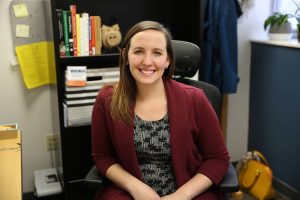When Nichole Anderson joined the University of Missouri College of Agriculture, Food and Natural Resources (CAFNR) Division of Animal Sciences in the fall of 2018, she was focused on bringing more technology into the classroom.
With the help of a United States Department of Agriculture (USDA) National Institute of Food and Agriculture (NIFA) grant, Anderson is taking a big step in that direction.
The grant, worth more than $270,000, is focused on using virtual reality to increase student understanding and interest in farm animal welfare. The four virtual reality modules that the grant will help develop will focus on operating, commercial dairy and swine farms.

“Many undergraduate and professional animal and veterinary science students in the United States come from non-rural, non-farm backgrounds,” said Anderson, an assistant teaching professor. “In order to gain exposure to animal production, students must primarily rely on their course and laboratory work within their degree programs. While courses often incorporate limited access to university and commercial farmers, there are a number of challenges – such as funding, biosecurity and large class sizes – that prevent students from gaining adequate farm exposure and experience solving common animal-related challenges.
“The purpose of this proposal is to investigate an additional mechanism for students to gain on-farm experience through the use of virtual reality modules focusing on swine and dairy production systems and common welfare issues they would likely come across while working in the livestock industry.”
Part of grant’s objective is to develop and evaluate the use of virtual reality modules in an entry-level freshman course to increase both student interest and understanding of swine and dairy production systems. She is also focused on using virtual reality to create animal welfare case studies that can be introduced in upper-level animal welfare, capstone production or first-year graduate/veterinary courses. Animal welfare focuses on the complete care of the animal, from birth to death.
“Virtual reality opens a door to numerous possibilities,” Anderson said. “I think it’s incredibly important that we look at innovative ways to reach our students. Technology certainly has a place in agriculture, and it’s exciting to explore some of those possibilities. For example, my background is in animal welfare. These modules will allow us to showcase common welfare issues and begin a conversation on how to address those issues.”
Anderson added that funding from the grant will also provide training opportunities for animal science-related faculty at other institutions to utilize and assess the success of the virtual reality modules in their own classrooms.
“In the perfect situation, students would put on the Oculus goggles and actually walk through the dairy and swine farms,” Anderson said. “There will be a option, though, where you can access the virtual reality simulation through a computer. We want to make our modules as compatible as possible.”
Anderson said that she is collaborating with North Dakota State University on the project. Be More Colorful, a company based in North Dakota, is helping with the virtual reality components.
“To accomplish our objectives, the plan is to utilize a multi-collaborator, multi-university and private business approach to develop, utilize and evaluate whether virtual reality could be a useful tool for preparing undergraduate students for a future in animal agriculture,” Anderson said.
The group is still working out when and where they will begin taking the video for the virtual reality modules. The COVID-19 pandemic has changed a few plans; however, it has also shown the importance of this type of technology.
“We actually put this proposal together before the pandemic really took hold,” Anderson said. “As we’ve had to practice social distancing and follow other measures, virtual reality could be an important tool moving forward.”